Work and life in Bulgaria
Back in 2008, I went some time to English courses in Moscow, and our group had a young teacher from Bulgaria named Vanya. Today I understand perfectly well that she knew Russian well, but then she skillfully disguised herself, speaking only English and pretending that she did not understand Russian in principle. I attended the courses for about half a year, and remembered Vanya at the end of 2010, when I moved with my family (wife, daughter, and cat) to live in Sofia, the capital of Bulgaria. Easy irony of fate.
In 2009, I practically did not know anything about Bulgaria, except for the classic facts that Bulgarian pepper is growing in Bulgaria (by the way, this fact is actually not a fact, but an ordinary myth) that “chicken is not a bird, Bulgaria is not abroad, ”and that somewhere there is the sea, where Soviet citizens rested. Over the next 5 years of living in this country, I have gained some experience and impressions, which I would like to share with readers.
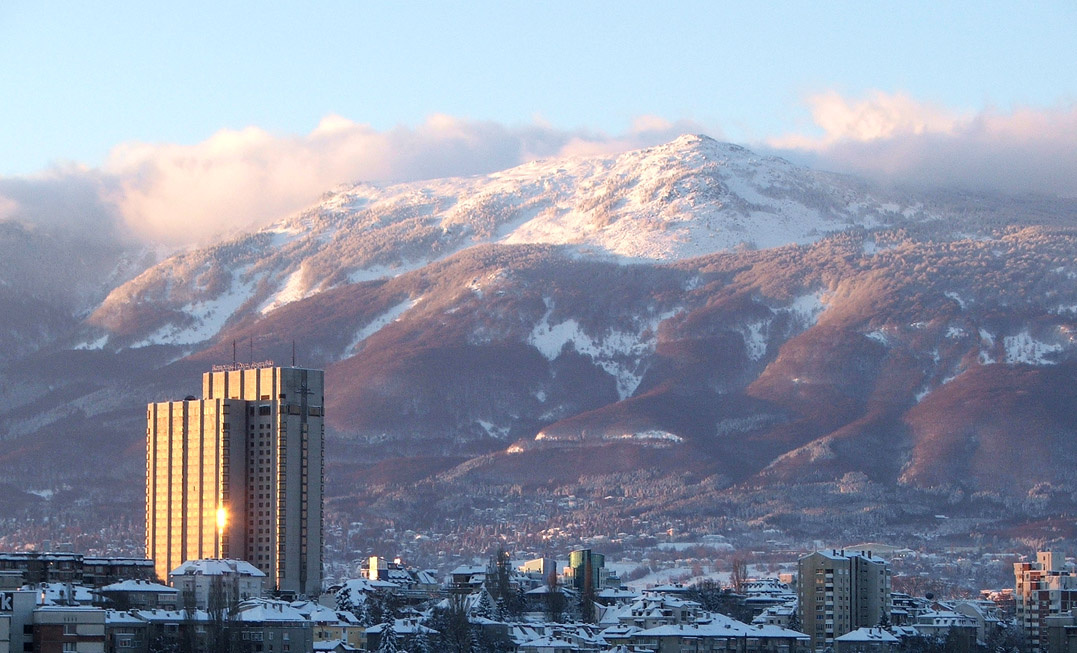
Hello to all readers!
')
I wanted to go live abroad for a long time, since I graduated from university. Unlike many emigrants, I didn’t have any dislike for my native country, which is why “I urgently need to start a tractor.” No, I was just led by curiosity, the very opportunity to live and work in another country, among a different culture, people. Such a feeling of a traveler, which makes them break free from their habitable places in search of new unexplored territories.
I considered various options: Australia, USA, Canada. Bulgaria did not appear on this list until one friend advised me to pay attention to this country. I figured out the business options that could be organized there (I did not plan to work for hire, besides, the opportunity to build my own business had long occupied my thoughts), issued a tourist visa and went to explore the capital of Bulgaria - Sofia.
Honestly, on the first arrival, Sofia was not very impressed with me. The poor city, with destroyed pavements and graffiti-painted walls of houses, gray buildings everywhere, some abandoned industrial zones ... In general, I had a feeling that I found myself in Bratislava from the Eurotour film. In addition, immediately upon arrival I was pouted by an unscrupulous taxi driver for 40 euros (although the official taxi to the city center will cost no more than 8-10 euros). The room in the famous Hotel Pliska, where the travel agent settled me, was shabby, and in addition at night I woke up from the rustle of cockroaches in the shower room. Breakfast at the hotel was disgusting, wi-fi worked with great difficulty. In general, then another place for 30 euros (by the way, this hotel was finally closed soon for reconstruction).
After a couple of days of exploring the city, my opinion began to change little by little, which later confirmed in me the idea that one should not trust only first impressions: something pleasantly surprising can hide behind an unattractive at first sight facade.

The first thing that struck me after Moscow was people. Smiling, polite, unhurried, sociable. Always prompted the road, while splitting almost go with me to the place. The taxi drivers turned out to be funny talkers all the way asking about Russia and Moscow, managing to tell their long life stories and at the same time scolding their own government (“they sold themselves to the Americans”). Upon returning to Moscow, I caught myself thinking: for the entire time of my trip, no Bulgarian has complained about his own life.
The second thing that pleased me is the mild climate. My first trip was at the end of September, it was very warm in the afternoon (although it was sensitively cold after sunset), and very dry. At the same time, there was no dust on the streets, I don’t know why this happens, because no one washes the roads here, unlike in Moscow. Roads, by the way, are not as smooth as in Moscow, but quite tolerable, and are better in quality than in the same native Ryazan.
Sofia is located almost in the center of the Balkans at the foot of Vitosha Mountain in a kind of pit, surrounded on all sides by mountains. For this reason, it is almost never windy in Sofia, which I personally like very much. There are no tropics here, there is a change of seasons, but the summer / autumn / winter / spring balance is quite different here than in central Russia. From about April to mid-October there is a hot and dry summer with rare torrential rains and noisy thunderstorms. Then until December there is a short autumn, which is not much different from summer, just not so hot. And then winter comes with terrible frosts right up to -10 degrees (it happens several times throughout the winter). On average, winter temperatures are around zero here, snow can fall only a couple of times throughout the winter, and usually in mid-February, the winter ends and a warm spring begins, which with its frequent fine rains helps the local farmers to grow excellent crops.
Sofia is also notable for the fact that it is enough to drive off 50 kilometers from the city, and you find yourself in the realm of the most beautiful mountain passes, where you can explore the wild caves.
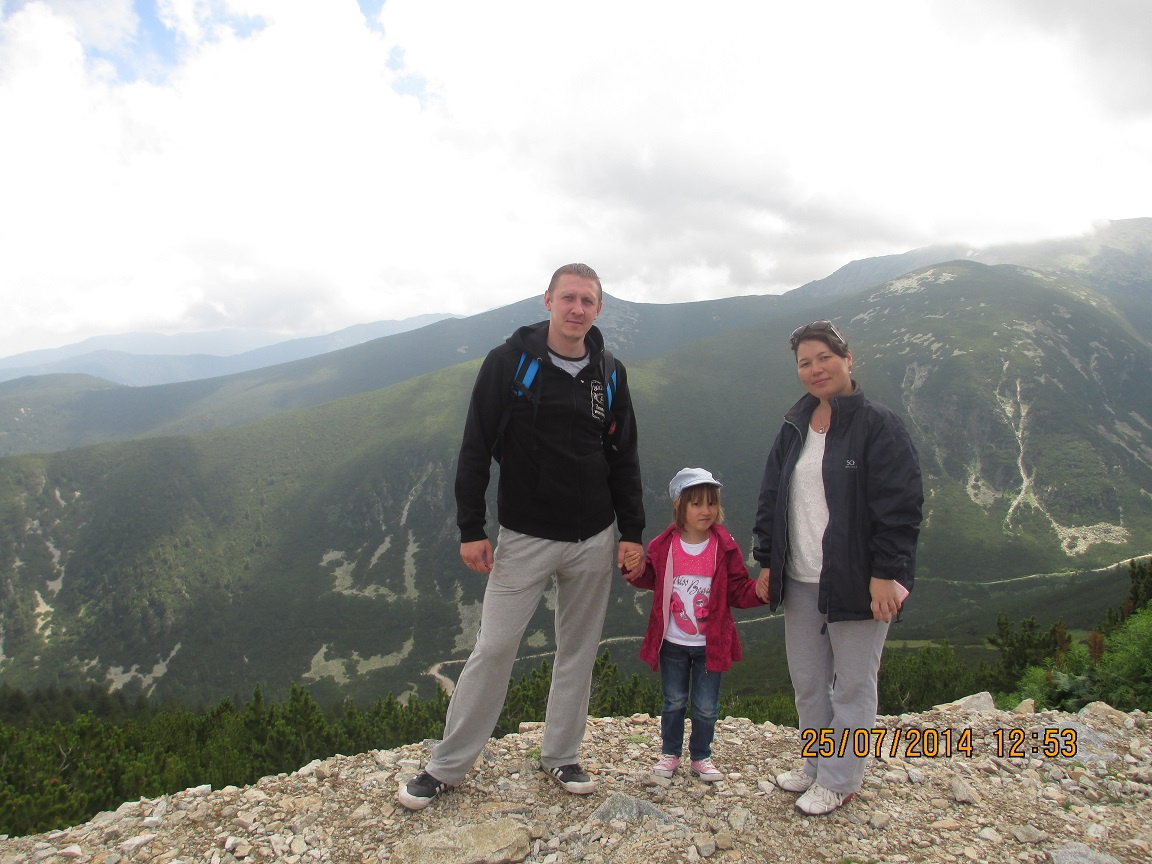
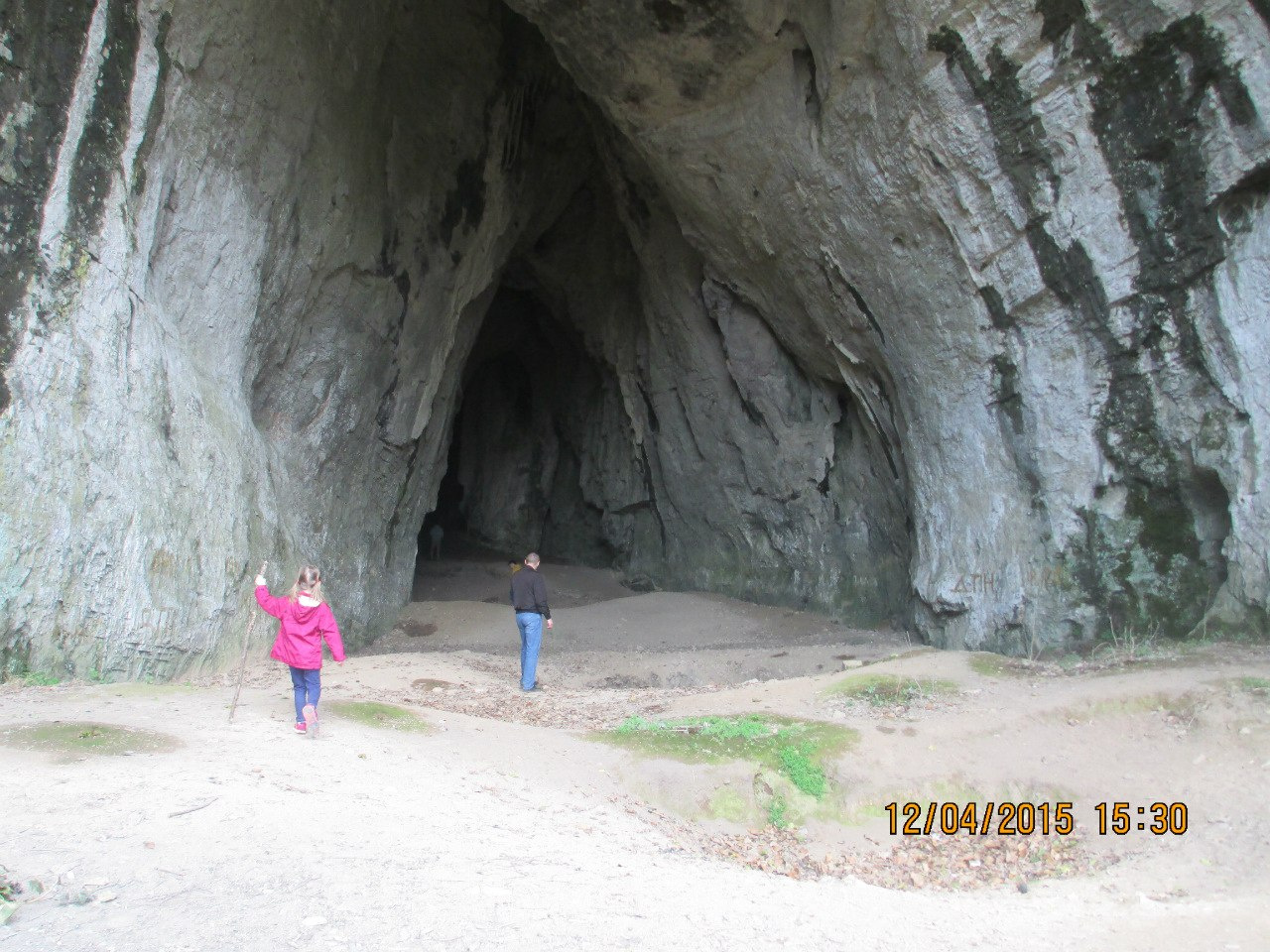
The city inherited a lot from the Soviet era, but over the past decades the architecture of the city has greatly changed. And typical Bulgarian houses today look like this:
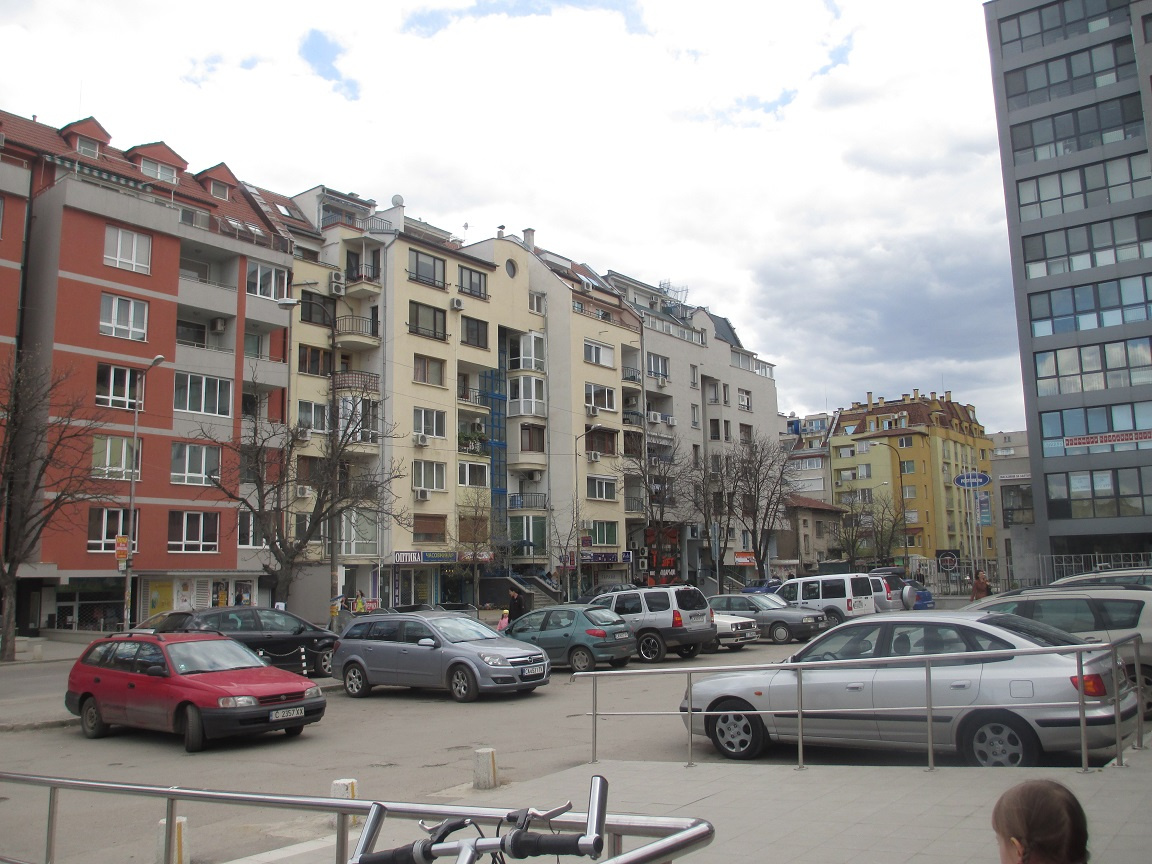
The city has a lot of greenery, flowers (especially beautiful roses in spring). Apricot trees and pears grow everywhere, the fruits of which in autumn fall overwhelm everything around.
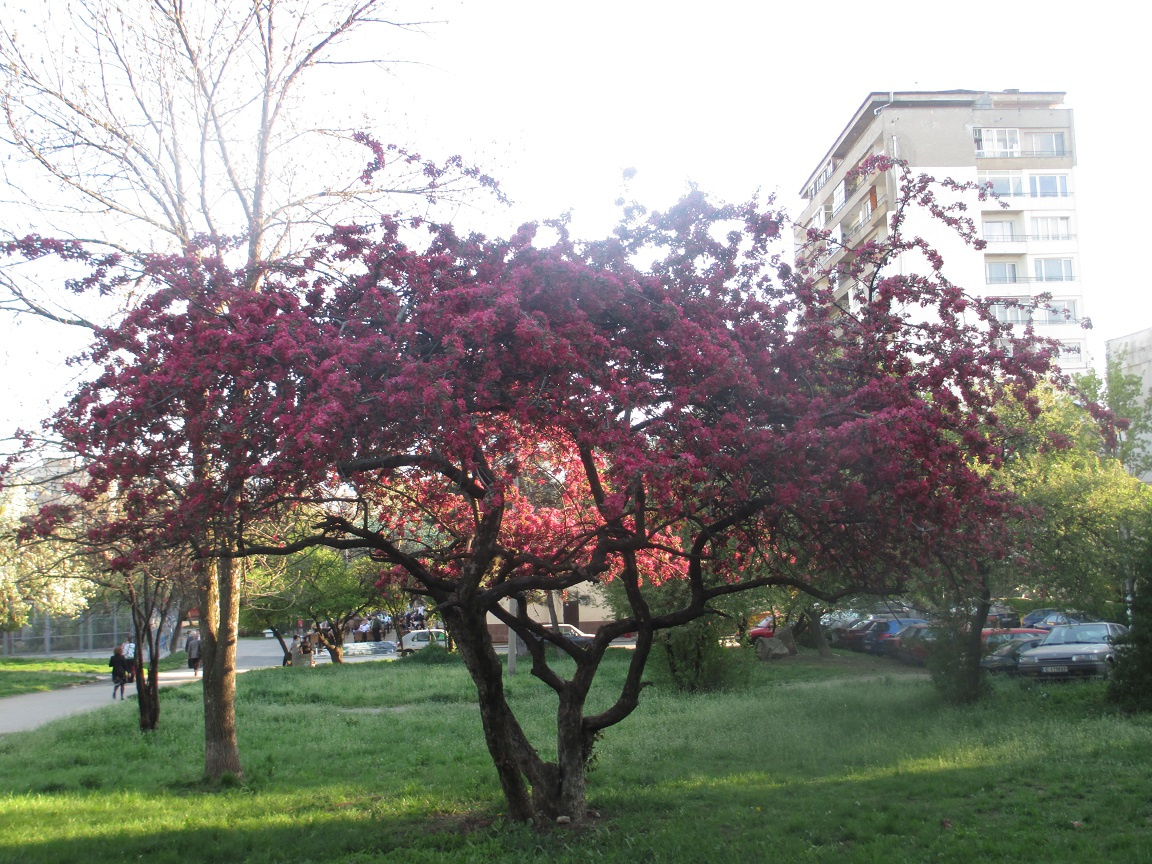
A scattering of small restaurants throughout the city allows you to have a snack at any time, or have a good lunch. For this reason, by the way, Bulgarians do not bother with cooking homemade food, preferring after work with their families to go to a cafe nearby to fully dine in the fresh air. Prices are quite affordable: a full three-course dinner costs about 10 euros per person with beer and wine. The most curious thing is that prices in restaurants are almost identical throughout the city, I did not observe scattering, with rare exceptions like some Greek restaurant with VIP service.
Since I mentioned prices, it is worth running around the whole, so to speak, consumer basket. Prices will be voiced in euros, although the native Bulgarian currency is a lion, but it is firmly pegged to the euro as 2 to 1 (2 leva for 1 euro). So briefly:
- rent a luxury three-room apartment with a full European-quality repair and furniture in relative proximity to the city center - 350-500 euros. The process of removal is not much different from Russia: the search is mainly through an agent (takes on average 50% of the commission), a contract is made out, and a deposit in the amount of a monthly payment is made when hiring. Everything is standard, everything is transparent. Analogue of local CIANA - https://www.imot.bg
- utility payments will vary greatly depending on whether you have a CHP plant (central heating) in your house, or if there are electric boilers. There is no gas in Sofia, so cooking is done only with electric stoves. In the summer, my account was about 25 euros for electricity and water, in the winter, the accounts reached 150 euros (I don't like it when it's cold at home).
- food prices are noticeably lower (about 1.5 times) than in Moscow stores. And here they do not suffer from such tricky marketing moves, when milk sells in a 900 ml package instead of a liter, and the beer is poured into 0.4 l cans instead of the classic 0.5 l. Fruits are much cheaper: sweet cherries are on the 1st euro per kilogram per season.
If we summarize at prices, I would say that you can live here for a budget of 1,500–2,000 euros for a family of three people without denying yourself anything (including a paid kindergarten, for which we paid 250 euros per month).
Speaking of salaries. The average salary of a programmer with a minimum experience of 1-2 years here is around 1000 euros, the salaries of experienced specialists reach 1500-2000 euros. It would not seem to compare with Moscow, but, again, this money is enough for a quality life with the ability to save a part in the piggy bank. In Bulgaria, unemployment is quite high, on the other hand, good specialists are being sought here during the day with fire. Experienced programmers often leave for Germany / England, or work remotely for customers from other countries. The analogue of the local hh is https://www.jobs.bg . There are also personnel agencies, but they are some kind of stupid in my opinion, it is better to look for work directly.
IT jobs are diverse, looking for PHP, C ++, and Java, and other languages / technologies. There is a classic site development, there is a complex backend. In Sofia there are both large representative offices of well-known companies: Microsoft, VMWare, EPAM, and offers from small local companies. Later I will tell you more about the features of employment in Bulgaria, now I will mention only one important point: good English is required. For local Bulgarians there is no problem, because here young people know English on a mandatory basis; they begin to teach this language already in kindergartens, and they teach it very well.
I also want to briefly talk about what ways there is to officially obtain a residence permit in this country. Bulgaria is in the European Union (at the same time, they do not want to let Schengen go), so many laws (including migration ones) are similar to the laws of the rest of the EU. Officially obtain a residence permit in several ways, fairly standard for all European countries:
1. To be a representative of a foreign company. Quite a common way, but has its own characteristics. I used this method.
2. Get married / marry a Bulgarian / Bulgarian.
3. Invest in the Bulgarian economy in the amount of 500,000 euros. I think that if you have such finances, then you will be able to dispose of them in the best way.
4. To be a unique figure who made a cultural and other contribution to the development of Bulgaria. We also reject this method if you are not Philip Kirkorov.
5. Open a company in Bulgaria where you need to hire at least 10 Bulgarian citizens (with salaries and taxes, of course). The way is quite realistic, if you have certain finances, and you really want to open your company here.
6. Retire :-) Between the Russian Federation and Bulgaria there is an agreement on the "exchange of pensioners." If you have a pension (size is not important), then you can get a residence permit on this basis. At the same time you can receive a pension from the Russian Federation in Bulgaria.
Earlier there was another way - these were the so-called “small investments”: it is enough to buy an apartment in Bulgaria (you can even by the sea) for 20-30,000 euros, and then the lawyer draws up this transaction as a small investment, and you received a residence permit. But in 2013 (or the 14th, I don’t remember, to be honest) this item was removed from the law, and everyone who had a residence permit on this basis was given about a month so that either the person would change his argument to be on the territory of Bulgaria or leave the country .
“But what about a work visa?” You ask. No way. It is very difficult to get, almost unreal. The employer makes such requirements for the hiring of foreigners, which is much easier for him to find among his own, or work with a foreign employee remotely. From the conditions we can mention the requirement to place a vacancy at the labor exchange and prove that for a certain time they could not find the right employee among Bulgarian citizens (this is the so-called “foreign worker must have unique knowledge or specialty”), high “white” wages, a crust about higher education. In general, my lawyer initially advised not to waste time trying to get this visa, but to go through the design of the representation.
(upd) - today it’s easier, I’ll tell you in more detail later
The procedure for obtaining a residence permit is quite transparent. You make an excuse (company representation, marriage document, etc.), go to the Bulgarian embassy (in Moscow it is located on Mosfilmovskaya street), and apply for a visa “D” (immigration visa). The term for issuing this visa is approximately 2 months. And already with this visa you arrive in Bulgaria, where you go to the police (Directorate of Migration, an analogue of our FMS), where you are already applying for a residence permit.
A residence permit is issued for a period of six months to one year, this fact depends on the city in which you are applying, and which employee will consider it. Further, the visa is extended, and so on until 5 years. After that, you can already apply for DRA (long-term residence permit) or permanent residence (permanent residence). These visas are already valid for 5 years and are also being extended. The difference between these visas is minimal. Citizenship can be obtained after 10 years of residence on the territory of Bulgaria, and then - with a number of requirements.
There are a lot of nuances, and I would not advise myself to do all the paperwork myself. It is much easier to refer these cases to a Bulgarian lawyer who for 1000 euros will do everything for you on a turnkey basis (I can give a contact to a lawyer whom I personally trust, and who prepared the documents for me and many of my friends).
That's all for now, I will not bore readers. In the next part I will tell you more about my relocation, about what I decided to do in this country, how my family settled here, and why Bulgaria is an ideal place for family freelancers with children.
P.S. Bulgaria is watching you:
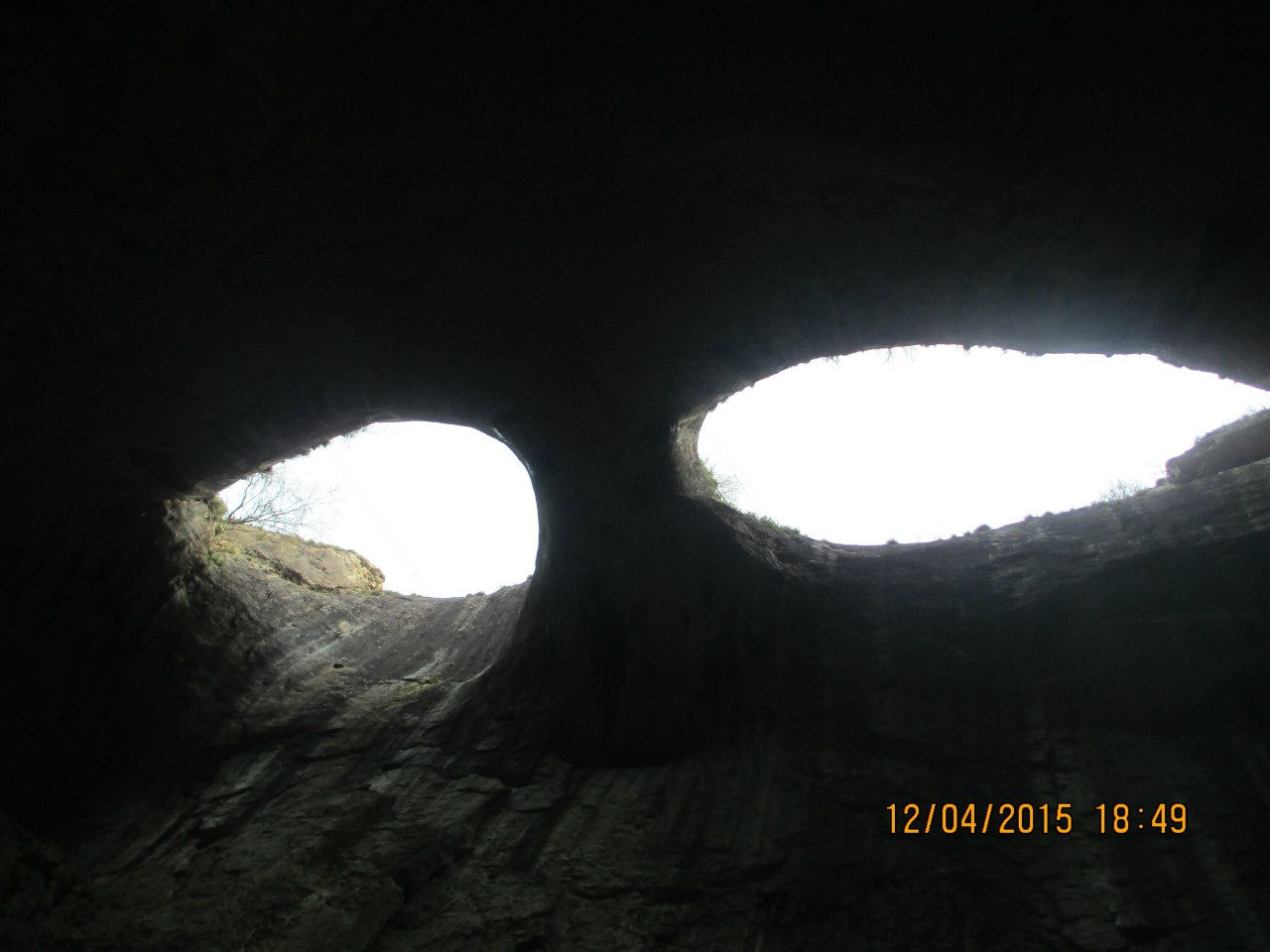
UPD. A few days later I will publish the second part, where I will definitely mention the important changes in the field of migration: since July, official explanations have been issued to the Directorate of Migration, where the rules for issuing a residence permit have been tightened through representative offices. From now on, there is no representation at the “nulevka” company, we need an office, etc., I’ll tell you in more detail.
On the other hand, there was good news for IT people: since the spring of this year, Bulgaria has published the official list of specialties the country needs, which includes programmers / sysadmins. A working visa (Blue Card) can now be issued much easier and faster. Wait for the news)
In 2009, I practically did not know anything about Bulgaria, except for the classic facts that Bulgarian pepper is growing in Bulgaria (by the way, this fact is actually not a fact, but an ordinary myth) that “chicken is not a bird, Bulgaria is not abroad, ”and that somewhere there is the sea, where Soviet citizens rested. Over the next 5 years of living in this country, I have gained some experience and impressions, which I would like to share with readers.

Hello to all readers!
')
I wanted to go live abroad for a long time, since I graduated from university. Unlike many emigrants, I didn’t have any dislike for my native country, which is why “I urgently need to start a tractor.” No, I was just led by curiosity, the very opportunity to live and work in another country, among a different culture, people. Such a feeling of a traveler, which makes them break free from their habitable places in search of new unexplored territories.
I considered various options: Australia, USA, Canada. Bulgaria did not appear on this list until one friend advised me to pay attention to this country. I figured out the business options that could be organized there (I did not plan to work for hire, besides, the opportunity to build my own business had long occupied my thoughts), issued a tourist visa and went to explore the capital of Bulgaria - Sofia.
Honestly, on the first arrival, Sofia was not very impressed with me. The poor city, with destroyed pavements and graffiti-painted walls of houses, gray buildings everywhere, some abandoned industrial zones ... In general, I had a feeling that I found myself in Bratislava from the Eurotour film. In addition, immediately upon arrival I was pouted by an unscrupulous taxi driver for 40 euros (although the official taxi to the city center will cost no more than 8-10 euros). The room in the famous Hotel Pliska, where the travel agent settled me, was shabby, and in addition at night I woke up from the rustle of cockroaches in the shower room. Breakfast at the hotel was disgusting, wi-fi worked with great difficulty. In general, then another place for 30 euros (by the way, this hotel was finally closed soon for reconstruction).
After a couple of days of exploring the city, my opinion began to change little by little, which later confirmed in me the idea that one should not trust only first impressions: something pleasantly surprising can hide behind an unattractive at first sight facade.

The first thing that struck me after Moscow was people. Smiling, polite, unhurried, sociable. Always prompted the road, while splitting almost go with me to the place. The taxi drivers turned out to be funny talkers all the way asking about Russia and Moscow, managing to tell their long life stories and at the same time scolding their own government (“they sold themselves to the Americans”). Upon returning to Moscow, I caught myself thinking: for the entire time of my trip, no Bulgarian has complained about his own life.
The second thing that pleased me is the mild climate. My first trip was at the end of September, it was very warm in the afternoon (although it was sensitively cold after sunset), and very dry. At the same time, there was no dust on the streets, I don’t know why this happens, because no one washes the roads here, unlike in Moscow. Roads, by the way, are not as smooth as in Moscow, but quite tolerable, and are better in quality than in the same native Ryazan.
Sofia is located almost in the center of the Balkans at the foot of Vitosha Mountain in a kind of pit, surrounded on all sides by mountains. For this reason, it is almost never windy in Sofia, which I personally like very much. There are no tropics here, there is a change of seasons, but the summer / autumn / winter / spring balance is quite different here than in central Russia. From about April to mid-October there is a hot and dry summer with rare torrential rains and noisy thunderstorms. Then until December there is a short autumn, which is not much different from summer, just not so hot. And then winter comes with terrible frosts right up to -10 degrees (it happens several times throughout the winter). On average, winter temperatures are around zero here, snow can fall only a couple of times throughout the winter, and usually in mid-February, the winter ends and a warm spring begins, which with its frequent fine rains helps the local farmers to grow excellent crops.
Sofia is also notable for the fact that it is enough to drive off 50 kilometers from the city, and you find yourself in the realm of the most beautiful mountain passes, where you can explore the wild caves.


The city inherited a lot from the Soviet era, but over the past decades the architecture of the city has greatly changed. And typical Bulgarian houses today look like this:

The city has a lot of greenery, flowers (especially beautiful roses in spring). Apricot trees and pears grow everywhere, the fruits of which in autumn fall overwhelm everything around.

A scattering of small restaurants throughout the city allows you to have a snack at any time, or have a good lunch. For this reason, by the way, Bulgarians do not bother with cooking homemade food, preferring after work with their families to go to a cafe nearby to fully dine in the fresh air. Prices are quite affordable: a full three-course dinner costs about 10 euros per person with beer and wine. The most curious thing is that prices in restaurants are almost identical throughout the city, I did not observe scattering, with rare exceptions like some Greek restaurant with VIP service.
Since I mentioned prices, it is worth running around the whole, so to speak, consumer basket. Prices will be voiced in euros, although the native Bulgarian currency is a lion, but it is firmly pegged to the euro as 2 to 1 (2 leva for 1 euro). So briefly:
- rent a luxury three-room apartment with a full European-quality repair and furniture in relative proximity to the city center - 350-500 euros. The process of removal is not much different from Russia: the search is mainly through an agent (takes on average 50% of the commission), a contract is made out, and a deposit in the amount of a monthly payment is made when hiring. Everything is standard, everything is transparent. Analogue of local CIANA - https://www.imot.bg
- utility payments will vary greatly depending on whether you have a CHP plant (central heating) in your house, or if there are electric boilers. There is no gas in Sofia, so cooking is done only with electric stoves. In the summer, my account was about 25 euros for electricity and water, in the winter, the accounts reached 150 euros (I don't like it when it's cold at home).
- food prices are noticeably lower (about 1.5 times) than in Moscow stores. And here they do not suffer from such tricky marketing moves, when milk sells in a 900 ml package instead of a liter, and the beer is poured into 0.4 l cans instead of the classic 0.5 l. Fruits are much cheaper: sweet cherries are on the 1st euro per kilogram per season.
If we summarize at prices, I would say that you can live here for a budget of 1,500–2,000 euros for a family of three people without denying yourself anything (including a paid kindergarten, for which we paid 250 euros per month).
Speaking of salaries. The average salary of a programmer with a minimum experience of 1-2 years here is around 1000 euros, the salaries of experienced specialists reach 1500-2000 euros. It would not seem to compare with Moscow, but, again, this money is enough for a quality life with the ability to save a part in the piggy bank. In Bulgaria, unemployment is quite high, on the other hand, good specialists are being sought here during the day with fire. Experienced programmers often leave for Germany / England, or work remotely for customers from other countries. The analogue of the local hh is https://www.jobs.bg . There are also personnel agencies, but they are some kind of stupid in my opinion, it is better to look for work directly.
IT jobs are diverse, looking for PHP, C ++, and Java, and other languages / technologies. There is a classic site development, there is a complex backend. In Sofia there are both large representative offices of well-known companies: Microsoft, VMWare, EPAM, and offers from small local companies. Later I will tell you more about the features of employment in Bulgaria, now I will mention only one important point: good English is required. For local Bulgarians there is no problem, because here young people know English on a mandatory basis; they begin to teach this language already in kindergartens, and they teach it very well.
I also want to briefly talk about what ways there is to officially obtain a residence permit in this country. Bulgaria is in the European Union (at the same time, they do not want to let Schengen go), so many laws (including migration ones) are similar to the laws of the rest of the EU. Officially obtain a residence permit in several ways, fairly standard for all European countries:
1. To be a representative of a foreign company. Quite a common way, but has its own characteristics. I used this method.
2. Get married / marry a Bulgarian / Bulgarian.
3. Invest in the Bulgarian economy in the amount of 500,000 euros. I think that if you have such finances, then you will be able to dispose of them in the best way.
4. To be a unique figure who made a cultural and other contribution to the development of Bulgaria. We also reject this method if you are not Philip Kirkorov.
5. Open a company in Bulgaria where you need to hire at least 10 Bulgarian citizens (with salaries and taxes, of course). The way is quite realistic, if you have certain finances, and you really want to open your company here.
6. Retire :-) Between the Russian Federation and Bulgaria there is an agreement on the "exchange of pensioners." If you have a pension (size is not important), then you can get a residence permit on this basis. At the same time you can receive a pension from the Russian Federation in Bulgaria.
Earlier there was another way - these were the so-called “small investments”: it is enough to buy an apartment in Bulgaria (you can even by the sea) for 20-30,000 euros, and then the lawyer draws up this transaction as a small investment, and you received a residence permit. But in 2013 (or the 14th, I don’t remember, to be honest) this item was removed from the law, and everyone who had a residence permit on this basis was given about a month so that either the person would change his argument to be on the territory of Bulgaria or leave the country .
“But what about a work visa?” You ask. No way. It is very difficult to get, almost unreal. The employer makes such requirements for the hiring of foreigners, which is much easier for him to find among his own, or work with a foreign employee remotely. From the conditions we can mention the requirement to place a vacancy at the labor exchange and prove that for a certain time they could not find the right employee among Bulgarian citizens (this is the so-called “foreign worker must have unique knowledge or specialty”), high “white” wages, a crust about higher education. In general, my lawyer initially advised not to waste time trying to get this visa, but to go through the design of the representation.
(upd) - today it’s easier, I’ll tell you in more detail later
The procedure for obtaining a residence permit is quite transparent. You make an excuse (company representation, marriage document, etc.), go to the Bulgarian embassy (in Moscow it is located on Mosfilmovskaya street), and apply for a visa “D” (immigration visa). The term for issuing this visa is approximately 2 months. And already with this visa you arrive in Bulgaria, where you go to the police (Directorate of Migration, an analogue of our FMS), where you are already applying for a residence permit.
A residence permit is issued for a period of six months to one year, this fact depends on the city in which you are applying, and which employee will consider it. Further, the visa is extended, and so on until 5 years. After that, you can already apply for DRA (long-term residence permit) or permanent residence (permanent residence). These visas are already valid for 5 years and are also being extended. The difference between these visas is minimal. Citizenship can be obtained after 10 years of residence on the territory of Bulgaria, and then - with a number of requirements.
There are a lot of nuances, and I would not advise myself to do all the paperwork myself. It is much easier to refer these cases to a Bulgarian lawyer who for 1000 euros will do everything for you on a turnkey basis (I can give a contact to a lawyer whom I personally trust, and who prepared the documents for me and many of my friends).
That's all for now, I will not bore readers. In the next part I will tell you more about my relocation, about what I decided to do in this country, how my family settled here, and why Bulgaria is an ideal place for family freelancers with children.
P.S. Bulgaria is watching you:

UPD. A few days later I will publish the second part, where I will definitely mention the important changes in the field of migration: since July, official explanations have been issued to the Directorate of Migration, where the rules for issuing a residence permit have been tightened through representative offices. From now on, there is no representation at the “nulevka” company, we need an office, etc., I’ll tell you in more detail.
On the other hand, there was good news for IT people: since the spring of this year, Bulgaria has published the official list of specialties the country needs, which includes programmers / sysadmins. A working visa (Blue Card) can now be issued much easier and faster. Wait for the news)
Source: https://habr.com/ru/post/336474/
All Articles